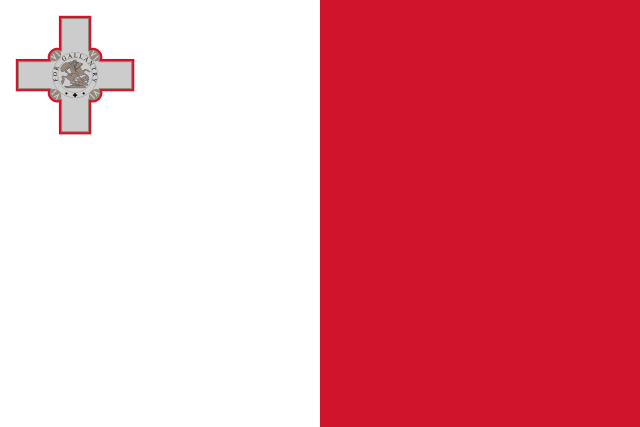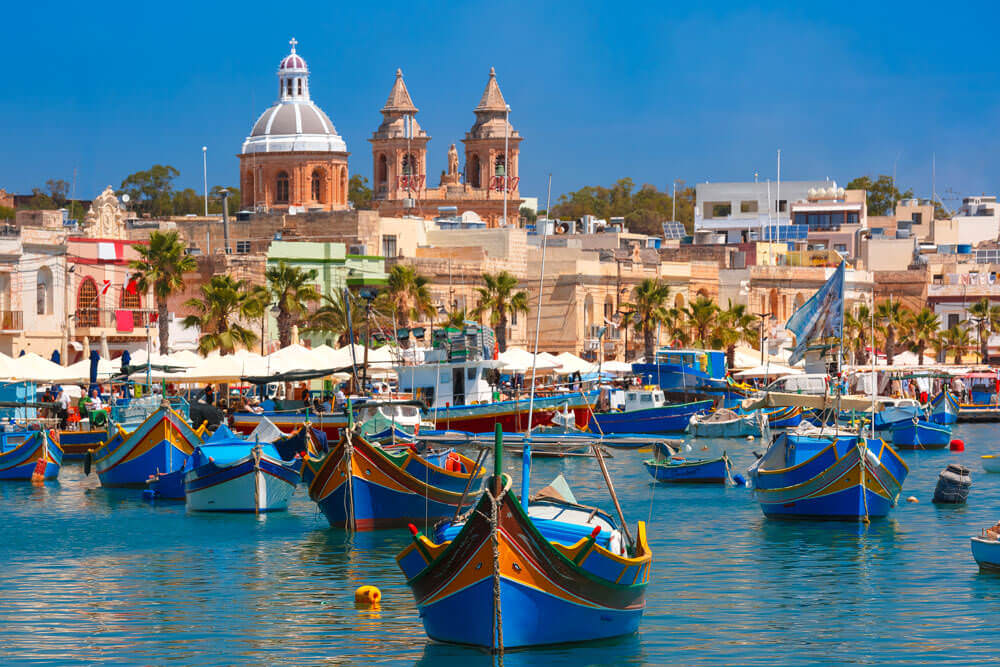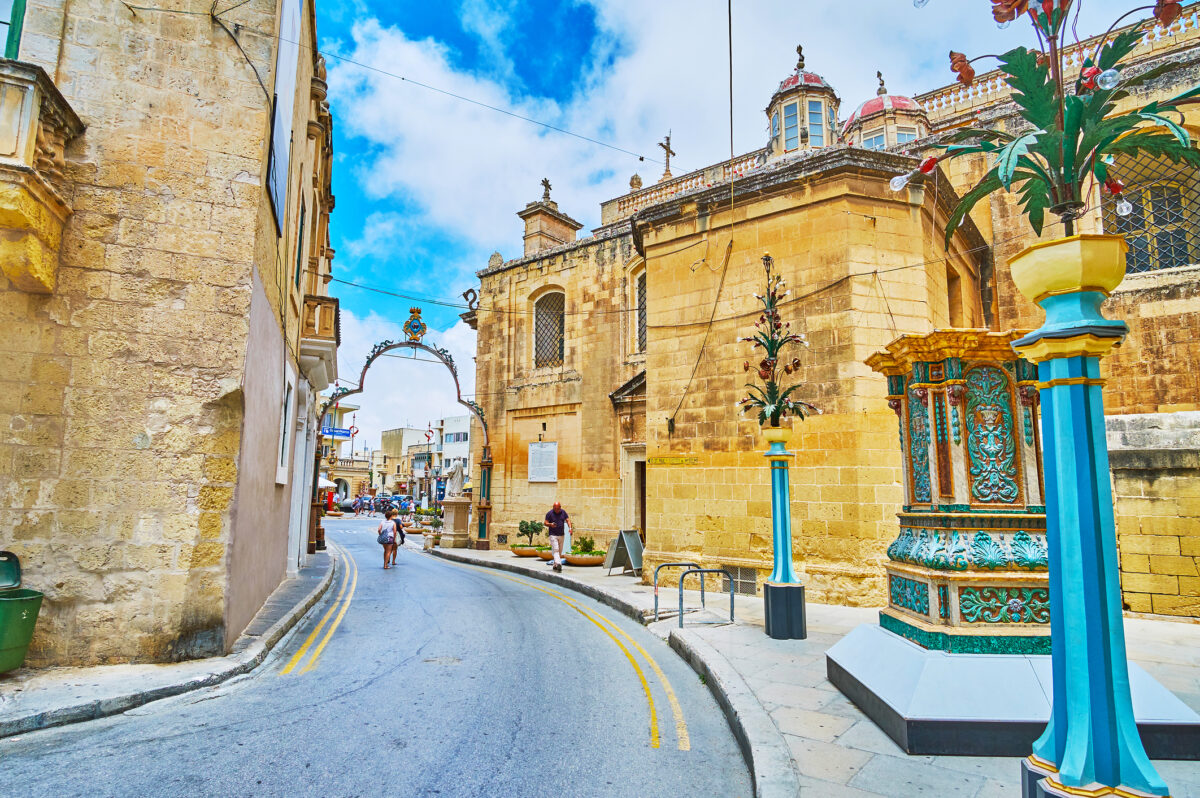Malta

Capital City: Valetta
Population: 444,454 (2022)
Land Area: 316 sqkm
Official language: Maltese; English
Time Zone: GMT+1-2hrs
Currency: Euro
GDP: 17.36 billion USD (2021 est.)
Main industries: Tourism, Ecotourism
Principal exports: Electrical equipment, pharmaceuticals and medicaments, toys
Malta is a group of islands in Central Mediterranean. The country consists of five islands – Malta, Gozo, Comino, Kemmunett, and Filfla. Malta is the largest among the five islands, Gozo being the second largest, while Kemmunett is uninhabited. The archipelago lies to the south of Sicily, the east of Tunisia, and the north of Libya, separating southern Europe from North Africa. With limited land area, Malta’s capital, Valletta, is the smallest capital in the European Union (EU).
An escarpment bisects the island of Malta along from Point ir-Raħeb to Għargħur. Most of the west coast of Malta is steep limestone cliffs of up to 250 metres with very few harbours. Slopes descend to lower altitudes on the northern and eastern coasts, on which the capital city is located separating Marsamxett Harbour and Grand Harbour. The island of Gozo also has high cliffs on the western coastlines with semi-circular bays formed. Malta has a typical Mediterranean climate with dry summers and wet autumns.

Demographics
As of December 2022, the population of Malta is 444,454. Around 95% of Malta’s population are of local Maltese nationality, and due to the island’s position between neighbouring countries, there are also a small number of citizens from North Africa and European countries. Following previous government-encouraged emigration, Maltese nationals have been returning to Malta in recent years. Malta’s population growth has slowed in the last century, rendering the younger Maltese citizens a smaller proportion of the country’s demographic. Despite this, Malta’s population density is amongst the highest in the world. Over 95% of the population is concentrated in urban areas.
The national language of Malta is Maltese whilst English also constitutes as an official language due to colonial history. Malta is known to be one of the top multilingual countries with 100% of the population speaking Maltese, 88% speaking English, and 66% speaking Italian. Roman Catholicism is the official religion of Malta, accounting for 98% of the population’s religious beliefs while Islam, Buddhism, other religions, and atheism account for the remaining 2%.
History
The earliest traces of human existence dated from 7000 years ago. Artifacts unearthed at Ħal Saflieni was declared a UNESCO World Heritage in 1980. In 218 BC, Malta was controlled by the Roman Empire and formed part of the praetorship of Sicily. St. Paul, the Apostle, converted the Maltese inhabitants to Christianity in 60 CE. Malta was subject to different foreign rule throughout its history. It came under Constantinople (now Istanbul) rule (395-535 CE), Byzantine rule (535-870 CE), Arab rule (870-1090), Norman and Swabian rule (1090-1266), Angevin rule (1266-82), and Spanish rule (1282-1530). In 1530, Malta was ceded to a religious and military order of the Roman Catholic Church and withstood the 1565 Ottoman siege. The capital of Valetta was founded in 1566, named after Jean de Valette, the grand master of the Order of the Knights, who successfully resisted the Ottoman siege that started in 1565.
In 1798, Napoleon captured the island of Malta. However, the French surrendered it to the British in 1800. The Treaty of Paris (1814-15) ratified constitutional guarantee of the Maltese’s rights as they acknowledged British sovereignty. The opening of the Suez Canal in 1869 helped Malta grow its trade and economy. In 1912, a dyarchical government is formed under which the British was responsible for foreign and military affairs, whereas the Maltese legislature handle local issues. However, this arrangement was withdrawn in 1933 due to Maltese resistance. Malta reverted to a colonial regime and became a military base during World War II. National sentiments grew after the war.
The British granted self-government in 1947, but revoked so in 1959 and restored so in 1962. On 21 September 1964, Malta finally achieved independence and became a Commonwealth member. On 13 December 1974, it became a republic. Malta was under the governance of the Nationalist Party (Partit Nazzjonalista; PN) from 1962 until 1971 when they lost the elections to the Malta Labour Party; the latter of which pursued rigorous non- alignment policies. The PN returned to leadership in 1987, seeking full membership of the European Economic Union (Later to become EU), but when the MLP retook office in 1996, they halted Malta’s membership application. In 1998, PN won the elections once more, restarting the application though it faced intense opposition from MLP. Alas, in 2003 by referendum, Malta officially joined the EU the following year, on 1 May, and adopted the euro as its currency on 1 January 2008.
Key Dates:
1921 Malta granted dyarchical self-governance for the first time
1964 Malta gains independence on 21 September
1974 Malta becomes a republic
1979 The last British military base closes
1990 Malta applies to join European Union
1995 Malta joins NATO’s Partnership in April for the Peace programme but leaves in October 1996 to maintain its neutrality
2004 Malta joins the EU on 1 May
2008 Malta adopts the Euro as its currency on 1 January
Legal System and Government
Malta is a unitary multiparty republic wherein the parliament consists of a unicameral House of Representatives based on the British model. Members of the parliament are elected for five-year terms by popular vote on the basis of proportional representation. The parliament elects the President, who is the head of state. The President appoints the leader of the majority party or coalition to be the Prime Minister, who is the head of the government on a five-year term.
Malta follows a mixed judicial system. On the one hand, the codified Maltese law follows Napoleonic law. On the other hand, criminal proceedings and fiscal and maritime legislation are based on English common law, yet without a binding judicial precedent. The judiciary is divided into the Superior Courts, which are presided over by a bench of judges, and the Court of Magistrates, which hear matters at first instance. Malta hosts a single tier system of appeal.

Economy
Malta is a high-income country with a GDP per capita of US$33,257, nearly threefold of the global average. Despite being the 6th smallest economy in the EU, it is the 25th richest country in the world.
The GDP of Malta reached US$17.36 billion in 2021, resulting in a 5.2% growth. The economy is highly industrialised and service-based, providing most professional services in the Mediterranean region. Notably, financial service providers manage assets more than 500% of Malta’s GDP and contribute to 15% of government revenues. Tourism is another pillar of the economy, contributing 27% to GDP. During the summer months, Malta’s economy is primarily fuelled by tourism.
Benefited by its geographical location between Europe and North Africa, Malta also serves as a trading hub with foreign trade representing 272% of the GDP. Due to the island’s lack of natural resources, Malta rely heavily on imported foodstuffs, water, and energy. It also manufactures and re-export mineral fuels and oils. Malta’s economy is one of the fastest growing in Europe and continues to benefit from the high value of foreign direct investment that it receives.
Trade
Malta’s GDP in 2021 amounted to US$17.36 billion. The main exports for the year included electrical machinery and electronics (23.1%), pharmaceutical products (15.6%), printed books, newspapers and other photographical products (10.3%) and mineral fuels, oils and products of their distillation (9.5%). The top export destinations for Maltese products were Germany (13.1%), Italy (9.2%), France (5.8%), and Japan (5.5%). Malta’s top imports for 2021 comprised of mineral fuels, oils and products of their distillation (17.7%), aircraft, spacecraft and parts thereof (13.8%), electrical machinery and electronics (10.9%) and ships, boats and other floating structures (8.0%). These imports were predominantly supplied by Italy (22.3%), Canada (6.7%), France (6.7%) and Spain (6.0%).
Malta has entered into numerous preferential trade arrangements as an EU member state.
Investment Opportunities
Investment in Malta is known to be a fairly stable choice, as the country is home to an educated and skilled workforce at low labour costs. Additionally, due to the island’s geographical position, it is an ideal location for investment projects which seek to operate either in or between Southern Europe and North Africa.
The Maltese government has recognised the need to promote ecotourism in its effort to protect the country’s World Heritage site and surrounding natural environment. Foreign investors may therefore seek to establish or finance existing sustainable travel options from Mainland Europe; this being the main source of Malta’s tourists. Similarly, conservation projects could render a positive return in the summer months, when the tourism sector is at its peak.
Although Malta exports refined petroleum, most of its energy is imported. Investment into green energy projects around the country could help to reduce the country’s trade deficit and serve as a sustainable alternative to existing power generation.